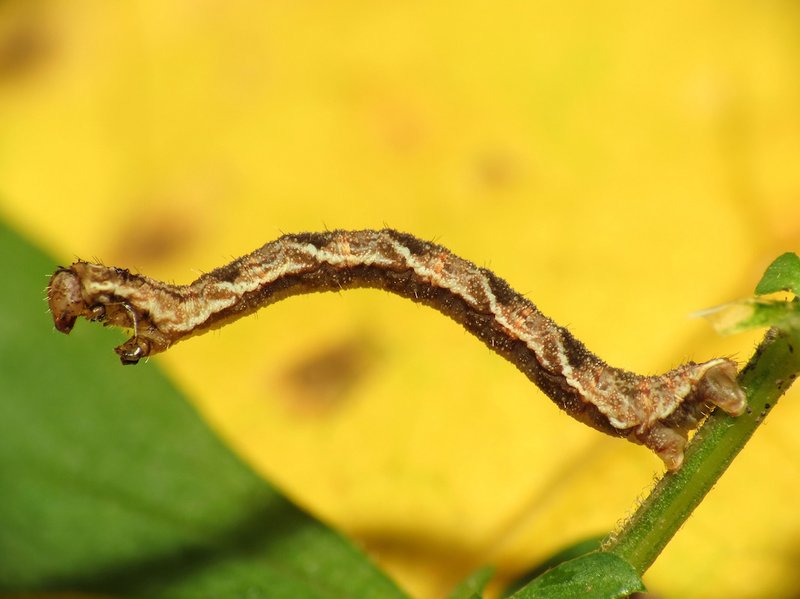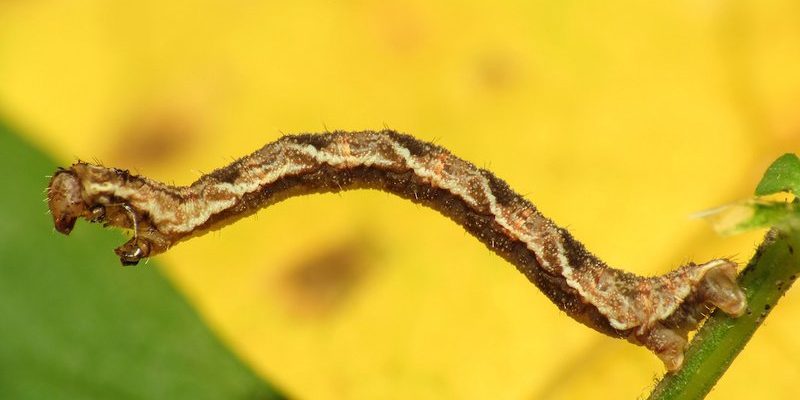
Think of inchworms like the curious kids in a garden playground. They might seem innocent, but sometimes their antics can lead to trouble. These little critters can munch on leaves and even cause some damage, but how much should you worry? Here’s the scoop on what inchworms are, how they interact with plants, and whether you should let them hang around your garden or give them the boot.
What Are Inchworms?
Inchworms are the larvae of certain moths, and their unique movement gives them their name. Instead of crawling like most caterpillars, they “inch” forward by bringing their back legs up to their front legs, creating a distinctive loop shape. It’s almost like they’re doing a little dance on your plants!
There are several species of inchworms, and they can vary in color from bright green to brown or even yellow. While some might look quite appealing, don’t be fooled. They have a voracious appetite, and their primary diet consists of leaves, which can lead to some noticeable damage in your garden.
You might be wondering what their life cycle looks like. Inchworms generally hatch from eggs laid by adult moths in the spring or early summer. They go through several molts, growing larger with each stage until they eventually pupate into moths. This cycle can repeat a few times within a single growing season, meaning that if they’re around, they could be a recurring issue.
How Inchworms Affect Garden Plants
Inchworms primarily feast on the leaves of various plants, which is where the potential harm comes in. They can create holes in leaves and defoliate entire plants if left unchecked. This can be especially concerning for tender seedlings or flowering plants that are just getting established.
Here’s the thing: while some plants can handle a little nibbling, others might struggle to recover from significant leaf loss. For instance, if you have young vegetable plants, they might not produce as much fruit if their leaves are too damaged. Think of leaves as solar panels for plants; without them, photosynthesis suffers.
It’s also important to note that while inchworms can cause damage, they’re not the only pests out there. So if you notice some unusual eating patterns on your plants, it might be worth checking for other culprits as well. But if you suspect inchworms are the problem, it’s time to take action.
Identifying Inchworm Damage
How can you tell if inchworms are the ones munching away at your plants? Look for these signs:
- Missing Leaves: If you notice gaps or holes in the foliage, inchworms may be to blame.
- Frass: This is a fancy term for caterpillar poop. Small pellets might be found under affected plants.
- Visible Inchworms: If you spot them crawling on the plant, that’s a clear indicator.
- Webbing: Some species create silk webbing while feeding, which can also signal their presence.
If you find multiple signs, act quickly! Ignoring them can lead to a larger infestation. And believe me, once they multiply, getting rid of them becomes much harder.
Are Inchworms Dangerous to All Plants?
Here’s where it gets interesting. Not all plants react the same way to inchworm damage. Some plants can withstand a little nibbler action, bouncing back without much fuss. For example, hardy perennials or certain weeds might shrug off a few bites.
On the other hand, sensitive plants—especially young trees, shrubs, or vegetable seedlings—can suffer significantly. If you’re growing tomatoes, peppers, or delicate flowers, inchworms can hinder their growth and overall health.
If you’re unsure whether to worry about inchworms in your garden, consider what you’re growing and how much damage you see. A few holes here and there might not be a big deal for a tough perennial, but it could mean trouble for your prized heirloom tomatoes.
How to Control Inchworms in Your Garden
If you’ve decided that inchworms need to go, don’t fret. There are several effective ways to manage them without causing too much stress on you or your garden.
1. **Manual Removal:** If you see them, just pick them off by hand. This might sound tedious, but it’s surprisingly satisfying and effective.
2. **Natural Predators:** Encourage beneficial insects like ladybugs or lacewings that prey on inchworms. You could also introduce birds to your garden by adding bird feeders.
3. **Insecticidal Soap:** If the infestation is getting out of control, you might consider using insecticidal soap. It targets soft-bodied pests and is relatively safe for plants. Just be sure to follow the instructions and apply it in the evening when beneficial insects are less active.
4. **Neem Oil:** This natural pesticide can disrupt the feeding and mating of inchworms. It’s a great option if you prefer a more organic approach.
5. **Diatomaceous Earth:** Sprinkling this fine powder can help deter inchworms as they move across it. It’s non-toxic and great for the environment too.
Whatever method you choose, being proactive can help you keep your plants safe from these pesky pests.
Preventing Future Inchworm Infestations
Once you’ve tackled an inchworm problem, it’s crucial to think ahead. Here are some preventive measures you can take:
- Regular Inspections: Check your plants weekly for signs of inchworms or other pests. Early detection makes for easier management.
- Promote Biodiversity: Grow a diverse range of plants. This can attract various beneficial insects that help keep pests in check.
- Healthy Plants: Ensure your plants are healthy and resilient. Proper watering, fertilization, and sunlight can help them withstand potential damage.
- Encourage Natural Predators: Plant flowers that attract beneficial insects. Marigolds and yarrow are great options.
By taking these steps, you can create a thriving garden environment that’s less appealing to inchworms and other pests.
So, are inchworms harmful to garden plants? The answer isn’t black and white. While they can definitely cause damage, the extent varies based on the type of plant and the size of the infestation. Understanding their destructive potential allows you to be proactive about protecting your garden.
With a little vigilance and the right strategies, you can keep your plants safe and healthy. And remember, gardening is all about learning and adapting, so don’t hesitate to tweak your approach as you discover what works best for you. Happy gardening!

